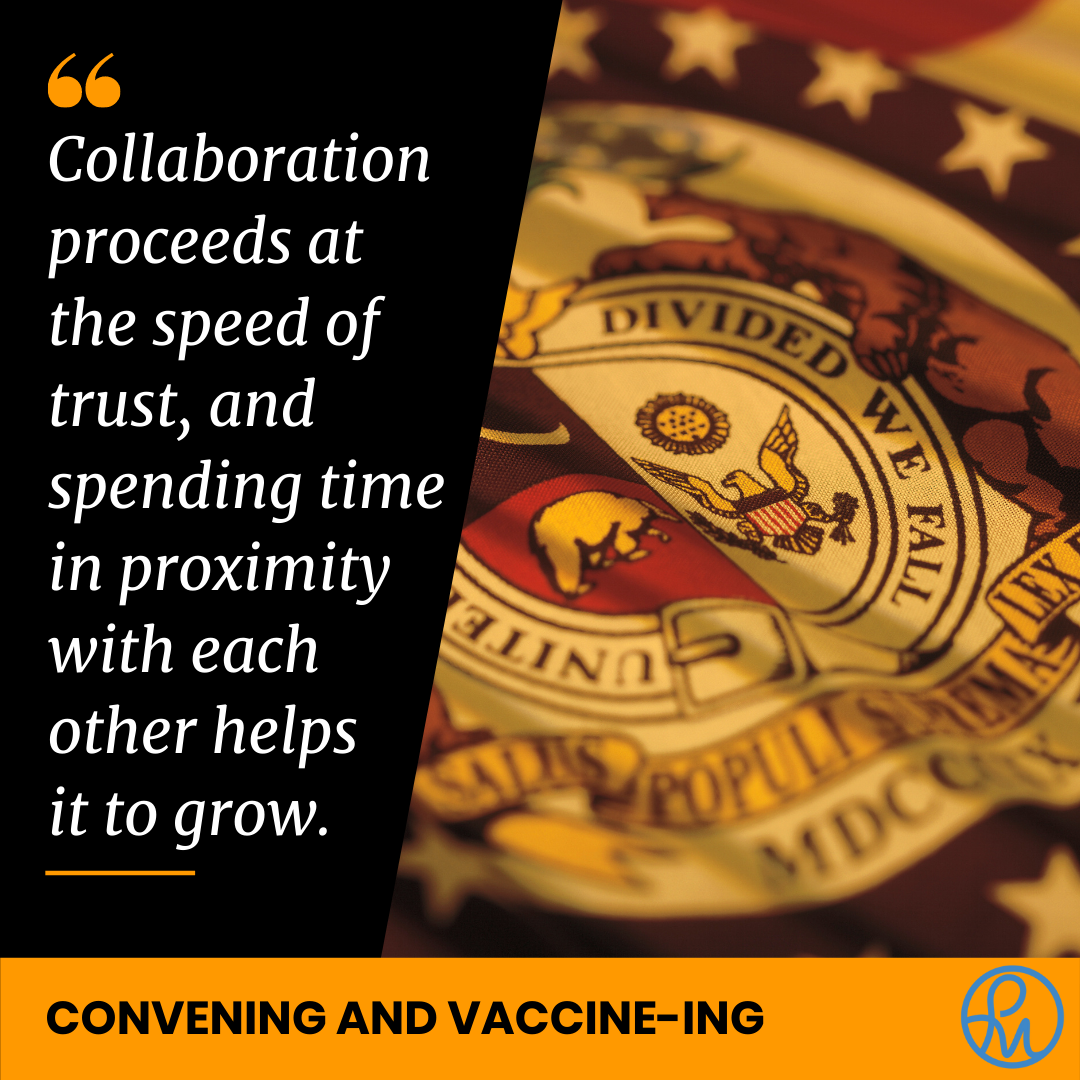
Blog post by Deborah Dubin, CEO & President, Philanthropy Missouri
Convening and Vaccine-ing
Parking lot moments: We’ve missed convening in person over the past 18 months. We are incredibly grateful for the technology that allows us to continue to meet at a distance, but it’s been hard to consistently convey the same warmth and connectedness that we try to maintain as a Membership Association when we gather over Zoom and other online video platforms. And we’re missing the “parking lot” moments—the serendipitous collisions and unique interactions that can occur after a program ends, when people are walking from the venue to their cars, take a moment to stop and talk, and maybe make plans to continue the discussion over coffee. Collaboration proceeds at the speed of trust, and spending time in proximity with each other helps it to grow.
When will we meet again? Like many organizations that convene in order to connect, we’re hoping to resume in-person programming sometime after Labor Day; we’re keeping an eye on CDC recommendations and the spiraling effects of the Delta Variant. Sadly, in Missouri, lower vaccination rates mean that hospitals in some of our regions are once again full this summer. As we plan for a busy fall of programs and events that feed your interests in learning, connecting, and acting with impact, we will be mindful of the need to keep our team and our Members healthy. And even as we look to a time when we will emerge from this public health crisis, we recognize not everyone will be able to join us in person. Some Members may have health concerns, distance or accessibility challenges that preclude them from joining us In Real Life (IRL). We’re working to come up with reasonable hybrid solutions, and we’re learning from peers about what strategies seem to work best for fostering inclusivity. Sometimes, more (and better quality) technology seems to be a part of the answer, even as we long for more (and better quality) human presence.
In the meantime, we’ll also be looking for ways to amplify the work of organizations that are tackling vaccine hesitancy. As this story from NPR shares, addressing vaccination compliance calls for more than a one-sized approach, and accurate, customized, and personalized communication is critical.
Grantmakers respond to communications challenges: Among the international grantmakers who are committed to strengthening public health response efforts through targeted communications, the Rockefeller Foundation recently announced $13.5 Million in new funding to address Covid-19 response efforts globally. The funding will support the design of interventions to build trust in Covid-19 vaccination efforts and identify what strategies might be most effective to counter and manage inaccurate and harmful information.
Regional partnerships: PrepareSTL is a communications and outreach campaign tackling the spread of the virus in communities of color and in low-to-moderate income areas. In Kansas City, efforts include a public/private effort that is implementing a 2 Million Arms Campaign trying to encourage the vaccine hesitant, particularly young adults, to get vaccinated. Other resources include VaccinateKC.org and PrepareMetroKC.org, which offer testing and vaccine distribution information. In southwestern Missouri, the Springfield-Greene County Health Department website offers a Covid-19 Vaccine tool kit and dashboard for tracking indicators.
Statewide, our Members report that they are supporting a range of interventions, organizations and initiatives, including funding community health centers and public outreach teams, as well as focusing on disseminating information and vaccines via faith-based organizations. Finding (and funding) trusted messengers—using multiple languages and platforms—is critical to stopping today’s crisis. Meanwhile, the Missouri Governor Mike Parson just launched a lottery for prizes of $10,000 that will go to 900 vaccinated people; 100,000 people entered their names in just the first 24 hours. “I ask you to turn off the clutter,” Parson said in announcing the incentives. “What we need now is good information.”
In Missouri, our ability to safely convene in person is directly related to the equitable access and mass acceptance of the vaccine. We are grateful for the work of Members who have supported efforts to increase vaccine availability and acceptance throughout the state. Building and maintaining trust has never been more important.
